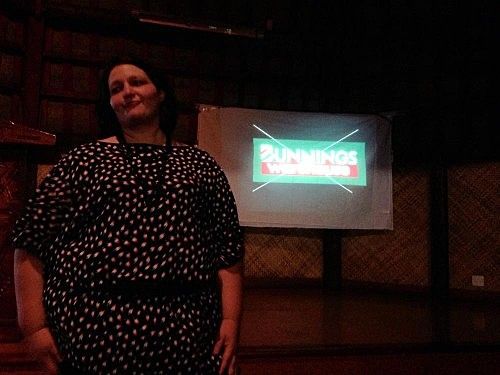Dull Thrills, Extraordinary Tedium: A Boring Night In Auckland
Greg Bruce reflects on an extraordinarily dull evening.
Late one recent Friday night, after attending Dull Dull Dull at the Fringe, I tried to explain what it was like to my wife. First, I set the scene. “It was in a fale,” I said.
“Was it a real fale?” she said, surprised. “On K’Rd?”
“Yes,” I told her.
“So it had open sides?”
“No, but it had flaxy stuff on the walls and a circular, a sort of, you know, a domed roof.”
She looked at me.
“Does a fale have to have open sides?” I asked.
“Yes," she said.
I changed the subject.
*
Throughout Dull Dull Dull, I'd been paying hard attention to how I would describe the fale - a vivid setting is the most basic building block of a good story - but I couldn’t quite get it. I could feel the fale in my head, know its authenticity in a non-lingual way, feel what made it authentic, but I couldn't transfer this to the mind of my wife and that was frustrating.
Six people spoke at Dull Dull Dull. All the audience knew was that they'd be dull, although surely none of them believed that, because if they had, surely none of them would have come. So maybe they thought the dullness would be a front, explicit irony, and therefore funny. Or maybe they thought, more credulously, that dull topics in the hands of people who were passionate about them would become interesting – that skilled interpretation of the dull could transform it. Maybe they thought something else. Maybe they didn’t think at all.
It was a small crowd, maybe 25-30 people, being part of the fringe and all, and the thing it felt most like was gathering to look through a friend’s holiday photos. When Bronwyn Bent showed a picture from a Bunnings advertising flyer and said: “They pretend that they get someone to draw all the products in their advertisements,” someone in the front row called out: “They do have someone who draws them! I met this person. It’s all he does. Brad’s his name.” and although that person’s friend eventually tried to stop her from talking, she didn’t and that didn’t seem wrong or bad.
Bronwyn, apart from being a speaker, was also the organiser of the event and had told me earlier that she had, in her previous career as a producer of events for The Edge, noticed a trend of people wanting to go out to hear other people talk, have conversations in public places, like old-style town hall meetings, and that’s what she had wanted to do with Dull Dull Dull.
Her talk was about her favourite hardware stores. Other speakers covered the following topics: church parish newsletters, personalised plates, outdoor toilets of New Zealand, the Coffee News, and something about chemistry, in which presenter Graham Stoddard, a science teacher, did an experiment with some liquid that burned through tinfoil. We all stood around and watched: “I need one of them to burn through, otherwise I’m stuck,” he said. I had Googled Graham before the event and found him on ratemyteachers.com where students at a previous school had said “BEST TEACHER EVA” and “coolest teacher ever!!!!” and called him “stodmeister”, and for much of his presentation my mind wandered, picturing him in front of a year 10 science class and flashing back to my own high school science lessons in which I rarely took an interest. He talked a lot about electrons and neutrons, but I took in none of it.
[caption id="attachment_6077" align="alignnone" width="500"] Local resident Bronwyn Bent is unimpressed with a certain New Zealand hardware store[/caption]
I’m going to be honest: I wasn’t engaged in the actual presentations for much of the night. Partly because I was wondering what the whole thing was about, wondering what that flaxy stuff on the walls was called, wondering how the audience was reacting to the speakers; partly because I was bored.
That’s trite though, isn’t it? Especially since what I’m trying to do here is to say something about the nature of boredom. Dull Dull Dull was inspired by The Boring Conference, which has taken place in England for the past couple of years, attracting large audiences, high profile speakers, wide media coverage and even boring sponsors. Although Dull Dull Dull wasn’t trying for that sort of scale, the principle was the same. But what exactly was the principle? There was no detectable irony in any of the presentations, although there were quite a few laughs, so maybe there was post-irony, which is the ironic belief that you are being unironic, and which is mostly undetectable. It seemed like all the presenters were genuinely passionate about their chosen subjects and much of the laughter was to do with the audience’s recognition of the absurdity of those passions.
At the end of the presentations, Bronwyn stood up and said that was it, the event was over. It didn’t feel much like an end, not of any traditional show at least, and nobody left for quite a while. It felt a bit anti-climactic because it was not at all clear what we had just seen or what we were supposed to take away from it.
Paying to watch something that openly claims to be dull may sound hilarious as a conceit, but the reality – strangers speaking, possibly post-ironically, about topics far from your heart in front of a few rows of chairs in what may or may not have been a real fale – turn out to be less amusing. But is there anything necessarily wrong with that? Surely, if you find yourself entertained throughout an event called Dull Dull Dull, something has gone quite wrong.
It’s tempting to say that maybe nothing is inherently dull, that if we bring our desire to learn and our full attention to any topic, no matter how mundane, we are capable of finding it interesting. But no matter how hard I tried to bring my full attention to some of the presentations at Dull Dull Dull, I couldn’t. Sometimes the questions in my own head – what makes something dull, what makes a good teacher, why audience members want to engage with speakers mid-presentation – were just more interesting to me than the questions raised by the presentations themselves. Was there a reason for that? Probably. Am I interested enough to work it out? I’ve already forgotten the question.
Everyone stayed in their seats, talking for a bit, then gradually stood up and carried on talking. The personalised plate, subject of Rosabel Tan’s presentation, was a popular discussion point. Somebody mentioned how you can now use number plates to dob people in online for bad driving, and added that she had recently done it. She also asked if anybody remembered the 0800SMOKEY number you could call to dob in people driving old dungers, but nobody did.
Leaving the fale, I put my ear buds in and walked to the bus stop on Symonds Street. I was aware that this would be an ideal time to reflect on what had happened, but we live in a world of distraction and it is hard when you have all those songs in your pocket not to listen to them when the alternative is a jumble of thoughts and feelings, because jumbles are confusing and humans dislike confusion. I don’t want to go into the science behind it because it’s boring, but it’s there and it’s real and you can Google it if you want.
In her presentation on personalised plates, Rosabel had talked about her mother Violet’s affection for teddy bears and how her father had one day bought her mother a number plate that said in small writing above the plate: ‘I <3 Teddy Bears’, and underneath, on the plate itself: ‘Viol8t’. The audience laughed when she first showed a picture of the plate, and again when she showed a funny graph depicting the proportion of people laughing and pointing while she was driving the Viol8t car as opposed to all other times in her life. But later in the presentation, she said the plate wasn't just funny, it was also sad, because it could also be seen as the result of an immigrant not understanding the likelihood of readers pronouncing the last syllable ‘ate’ rather than ‘et’ and the mockery that could result from that. Maybe, unlike me, you had already felt that sadness, but would you have felt it if you had seen the plate outside of that context, while driving around Auckland, say, distracted by the radio and your thoughts about being late for wherever you were going, and the hilarity of Marc Ellis and Hayley Holt on the wireless? Or would you have just laughed and thought nothing more of it?
*
The electronic sign on Symonds St told me my bus was nine minutes away, which turned out to be off by a multiple, and when it finally turned up and I put my hand out it kept on going. The sign said the next bus was 20 minutes away, which almost certainly meant 40 and left me no choice but to force my wife to come pick me up.
She had texted me earlier to say Uh oh hate to tell you who’s on Graham Norton, I better not which I knew to mean Paul Rudd, with whom I’ve been obsessed since his performance in I Love You Man redefined what it meant to be a leading man in a romantic comedy.
Fuck! I texted back, I bet he’s being charming and cute and funny and self-deprecating! x
Well let’s just say I know the names of his balls! she wrote, which was exactly the type of hilarious, unexpected revelation I expected from him.
I don’t know if you’re interested in text exchanges between me and my wife, but they’re relevant because they show the extent of my immediate reflection on Dull Dull Dull, specifically that it was overwhelmed by the thought that I was missing out on watching television, my Friday nights being somewhat less thrilling than you might have hoped.
When I missed that first bus, and it became obvious I was going to see, at best, only the end of Graham Norton, that thought and its associated emotions dominated my attention. As I walked towards Mt Eden, I sent a series of lightly passive aggressive texts to my wife encouraging her to hurry, which she didn’t, arriving only in time to get me home for the last five minutes.
Walking along Symonds St, past the awful apartments on the corner of Khyber Pass, with their panoply of struggling ground floor businesses, I felt I should at least try to implement what I took to be the main lesson of Dull Dull Dull: that things are only dull until you decide they aren’t. I looked at the advertising poster in the bus shelter I was passing and meditated on it. What made it interesting? What was its significance? But I couldn’t make anything of it. I don’t even remember what the poster was. I could go back, I guess, but of course I won’t.
Rosabel's slides:


